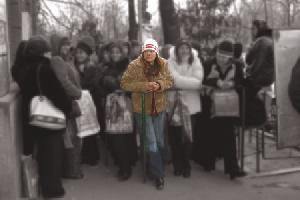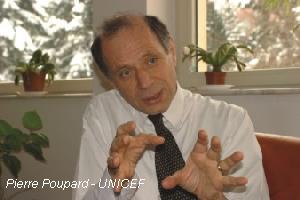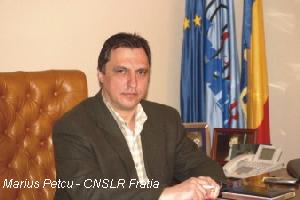Human Capital
 A massive drop in its reported population last year was not necessarily due to falling birth rates or an exodus from Romania, but the result of news that over ten per cent of Romanians now work abroad, many illegally. Anca Pol reports on Romania's most popular export product: its people . A massive drop in its reported population last year was not necessarily due to falling birth rates or an exodus from Romania, but the result of news that over ten per cent of Romanians now work abroad, many illegally. Anca Pol reports on Romania's most popular export product: its people .
Low wage work in the west is attracting Romanians of all ages into six-month or longer stints of employment in, for example, picking fruit, working as pole dancers or on building sites.
But this often black market trade is also attracting human traffic and, due to this non-union, sometimes untaxed and unregulated work, there are severe risks of employer and sexual abuse.
However, with billions sent back to Romania through international money transfer, some analysts argue these job tourists are helping to prop up and grow the local economy.
“You're asking me what I did in Japan?” says a 23 year-old Romanian woman. “I worked as a hostess. And as a dancer. Topless, I mean. Anyway, we didn't have to do anything we didn't want to.” Her first work trip was to Yokohama in 2003. “I learnt about this business from a work colleague of mine who had been there before and asked me one day what I wanted to do with my life. She told me about the job and I was interested, because of the money, of course.”
It was not hard for her to leave. First, she had to pass a casting session held in Romania by a representative of the Japanese firm. Once accepted, she, along with seven other young Romanian women, signed a six month-contract, accompanied by copies of their passports, personal data and the results of a medical analysis. Also, they had to pay a 30 USD visa fee, as the employer was the one who took care of obtaining it from the Japanese Embassy. “Before leaving, I was very worried about where I would end up, but anyway, it was okay for me. I was earning 600 dollars per month and the Japanese firm gave me food, housing and transport.”
In 2004, she worked in Kyoto and this month, she is going again to the same country and the same topless dancing job. “It's like a drug,” she says. “Once you've been abroad, you always want to go back there.”
This work, as an above-the-board sex worker, avoids the difficulties encountered by many Romanian victims of forced labour. Ashamed and lacking information about governmental or non-governmental organisations which can help them recover from their trauma, women who do succeed escaping the grip of sex trafficking, before coming back to Romania are difficult to assist.
Threatened by their pimps or sex-slave owners and with not enough money to pay their own ransom and trip back home, not to mention being handicapped by the language barrier, few of the hundreds of Romanian trafficked women and children succeed in returning to Romania.
“We're talking about only a few dozen escapees,” says Pierre Poupard, Representative for Romania of the United Nations Children's Fund (UNICEF). “A dozen women are now in the care of a UNICEF-financed centre based in Pitesti which has been functioning for two years now. These women survived hell. Two of them have babies and they have now stayed in this centre for one year. We teach them to live normally and to find a job once they leave the centre.”
It is even worse when the victims of sex traffic are children, as they are even more incapable than trafficked women of returning to Romania on their own. Salvati Copii (Save the Children) is one of the organizations which try to help the few who come back. “The children are first held in rehabilitation centres for some time, until the return to their families is prepared, as both the child and its family have many problems to deal with if the return is too sudden,” says Poupard
Even legal migrants feel themselves threatened by unknown risks of abuse. “I've worked all my life in a bakery,” says a 42-year old woman from poverty-stricken southern Romanian city Calarasi, who hopes to be picking Spanish olives a month from now. “Actually, it seems half of Calarasi [around 36,000 people] is now working abroad. My contract is as legal as possible, but I am still afraid. Many of my friends and neighbours have been conned.
“That is because one of my neighbours went to Spain and she and some others, were taken in by a con man who promised them a working place in the fields. And he took them to a, you know, brothel. The women were over 50, so the Spanish boss went mad: 'What kind of rags have you brought me?' he said, so he put them to work in the kitchen. The poor woman is now too ashamed to come back home.”
Viva Espana?
 Italy and Spain may be prime tourist destinations, but it is not to watch a bullfight, drink Sangria by the pool or take a stroll under the eaves of the Sistine Chapel, that over 1.3 million Romanians head there.
The areas for work in these two top job migratory targets for Romania include farming, construction and the food processing, hotel and sex industries. Out of this figure, less than half (over 650,000 people) have legal work contracts, according to an estimation by the union CNSLR Fratia.
It is not always illegal. But it is always hard work and much harder than for an employee from the EU. “I started working in Italy in 2002, with small holidays every three months or so,” says a 28 year-old Geography-Geology graduate. “What we do is to dig small tunnels, it's a tough job. I earn around 1,000 Euros per month and I guess an Italian would earn over 2,000 Euros for the same work.”
Because Spain is such a popular destination for Romanians to pick fruit, a new word has appeared in Romanian to name the migrants heading to Spain mainly for agriculture work: capsunari (the strawberry pickers). The desperation of these work migrants has now become a badge of failure. “Do you want to become a capsunar or what?” a teacher will ask a lazy pupil in school.
December and January were busy months at the Office for the Migration of the Working Force (OMFM), a governmental body under the jurisdiction of the Ministry of Labour.
This period is when Romanian workers are selected to start their work fruit-picking in the Spring months.
On a frosty January morning many potential migrants queue outside the OMFM, sometimes for days and nights at a stretch, in freezing temperatures. These migrants arrive in Bucharest from all over Romania, aiming to receive the prized possession of a six month contract in Spain, Italy, Germany or Qatar. When the selection takes place, in spring or in summer, the conditions improve, as it is now warm enough for them to sleep on the benches in nearby Cismigiu Park.
“I've been standing in this queue since four am to receive my passport with the
visa for Spain on it,” says a 35 year-old woman. She stretches her blanket over her winter jacket a bit tighter and she adds. “I've worked for 15 years in a textile factory and now I have to go to the end of the world to pick lemons, but I hope that at least there I'll be respected for my work and be paid properly. I know that a Spaniard would be paid double for the same work I do, but for us the 800 Euro wage there for four weeks is the same I'd earn here in ten months.” She sips some more hot coffee, with her hands wrapped around the plastic cup for warmth. “I'm afraid of being far from home, but I'm not afraid of hard work. God willing, it's for the best.”
A deal or a steal
 Together with the Office for the Migration of the Working Force (OMFM), in Romania there are around 750 so-called “working abroad mediators”, busily trying to recruit poverty-stricken Romanians into international employment. Most of these lack proper education in the field of human resources.
Besides these 750, there are numerous independent individuals who simply have contacts abroad, called racolatori. They gather Romanians willing to work and send them abroad without offering them any contractual guarantee, often charging high costs for their services.
“These mediators are the most dangerous,” says Daniela Andreescu, director of the OMFM, as they do not protect the rights and the safety of the migrant worker in any way. That applies also in the case of individuals who apply directly to the embassies based in Romania for work places they offer in their representative countries, argues Andreescu.
“Many are fooled by independent work mediators, they are required certain sums of money and they leave the country without knowing their rights and duties as workers in that particular country,” adds Andreescu. “They are also exposed to bigger risks and as much as 80 per cent of them may end up as victims of traffic and exploitation. The probability of obtaining a legal contract through an independent mediator is of around ten per cent.”
Those willing to take this risk are either people who lack information, those who already have a history of illegal migration, have been expelled from a country or are too old to pass the selection process held by the legal migration mediators.
The demand for working abroad is massive and those willing to work are not far behind. As a 2004 International Labour Organization on Romania shows, the most important reasons to find employment abroad are, quite predictably, a lack of resources at home, the lack of employment prospects and the potential for a better life abroad.
But this is not just confined to the long-term unemployed and working classes. There are numerous Romanian students trying to fund their studies abroad, and they are not exempt from exploitative tactics. Long hours, missed payments and a lot of sacrifice for little gain characterised Oana's experience as a waitress in Switzerland.
Now a lawyer, she needed to fund a year of studying in Switzerland by working full time. Through a friend, she managed to find a job as a waitress in a lowbrow restaurant near Fribourg in the French part of Switzerland. Although she received food and accommodation, she had to work from three to eleven every night, while going to school during the day. Her salary was the minimum wage, around 1,000 Euro per month, compared she said, to her Swiss colleagues, who earned twice that figure.
“I only had two weekends free in one year,” she says. The bosses only gave her holiday pay of 100 Euro, and some months the pay never appeared. “I had the feeling the bosses were mistreating me, and were always trying to take advantage,” she says. But the situation was worse for her colleagues from Sri Lanka and Vietnam, who worked in the kitchen and washing-up for longer hours and lower pay. “I was disappointed and paranoid,” she says of her time as a waitress. “I lost seven kilograms and slept little. I left before I finished my degree. I had enough of Switzerland. I worked like a horse and lost one year of my life. I'd never do it again.” However, there were some benefits. “At least I learnt French,” she says.
All work and low pay
The main targets for the Romanians lured by the mirage of western wages are Italy, Spain and Germany, followed not far behind by Hungary, according to Daniela Andreescu of OMFM, but there are fears that as the work numbers rise, the rights of individuals abroad may lack representation.
Last January, in order to increase the support for migrant Romanians, four work attaches were sent to the Romanian embassies of Madrid, Bonn, Rome and Budapest.
“This initiative belonged to us,” says Marius Petcu, president of the union CNSLR Fratia. These work attaches placed in Romanian embassies are entitled to give information to those working in the countries where they are based regarding their rights and duties in that specific country.
The attaches also offer counselling in work conflicts, respecting the legal frame of each specific country.
However there is a risk such representation abroad could be dropped.
“We have received signals they might be recalled,” tells Valentin Mocanu, Chief of the Counsellors' Corps of CNSLR Fratia. “They are professionals, without any political colour, so I hope they are not called back for political reasons.”
Accompanying this activity, unions have begun to establish connections with fellow federations in Germany, Italy, Portugal, Israel and France. “So that we can better reach the needs of our fellow citizens through the help of the unions functioning there and we are now waiting for a response,” says Petcu.
However he admits that he lacks mutual help at present, mainly because only Romania sends its work-force out, while receiving few employees from other nations. But, once the free movement of work intensifies, he believes a two-way work track could open.
Governmental bodies who deal with this issue, including the Office for the Migration of the Working Force, feel piled up in bureaucracy, which blocks international communication on the issue of migration. On the other hand, the level of openness to communication differs from case to case. “We have a good cooperation with the Romanian Consulate in Madrid. With many other consulates I could say we have no cooperation at all, even though there are many Romanians in the countries where these consulates are based, such as in Germany, Rome and Milan.”
Despite its five million unemployed, Germany appears to be the latest trend as a target country for Romanian work migrants. 22,000 Romanians received work visas for Hungary last year and only 17 of them left through a OMFM work frame. The rest of 21,983 chose an illegal route rather than the governmental one. The German Embassy based in Romania is one of the embassies which have a more intense cooperation with Romanian bodies interested in migration issues.
“We have had a remarkable cooperation with the representatives on social issues of the German Embassy in Romania. The same with the Japanese and United States Embassies, as it is in their interest to find solutions to the problems caused by the migration of the working force,” says Petcu. “Migration puts pressure on the working force of those specific countries. A solution that was put forward was an increase in foreign investments to Romania, which makes it more attractive for Romanians to remain and work in Romania.”
Canada is also an interesting destination for Romanian migrants. According to the information from the Canadian Embassy in Bucharest, most of the Romanians travelling to Canada for work purposes are skilled workers in the construction industry, a few live-in caregivers for small children and the elderly and some work permits are also given for post-doctoral fellows and ski instructors. The total number of Romanian workers receiving work permits for Canada is 145 in 2005, but as far as illegally fleeing to Canada, once again it is difficult to give precise figures.
“I do acknowledge that the problem exists not just for Romanians, but for the other countries we cover such as Bulgaria and Moldova,” says Catherine Bailey, Counsellor on Immigration Issues at the Embassy of Canada to Bucharest. “As economic conditions in Romania improve, the incentive to enter another country such as Canada should, we hope, diminish.”
Restrictions are also coming into play in nations such as the UK and Spain. Leading up to an election this year when migration will be a decisive issue, the British government is to close its door on unskilled migrants from the developing world who come to Britain legally under existing work permit schemes.
In Italy and Spain, on the other hand, Romanians willing to obtain a work permit need to now gain a work-place beforehand.

|
A nation abroad |
A figure the size of the population of Paris, 2.5 million Romanian citizens, work abroad at present, out of which less than 40 per cent have a legal situation and the right to insurance.
Italy:
800,000 workers, out of which 350,000 are legal
Spain:
500,000 workers, out of which 250,000 are legal
Germany:
300,000 workers, out of which 200,000 are legal
France:
200,000 workers, out of which 80,000 are legal
Hungary:
150,000 workers, out of which 60,000 are legal
United States and Canada:
500,000 workers
Belgium and The Netherlands:
120,000 workers, out of which 50,000 are legal
*Source: CNSLR-Fratia |
|